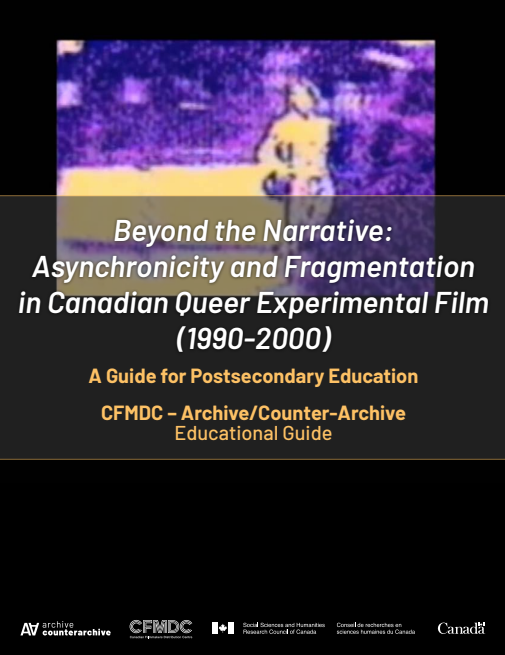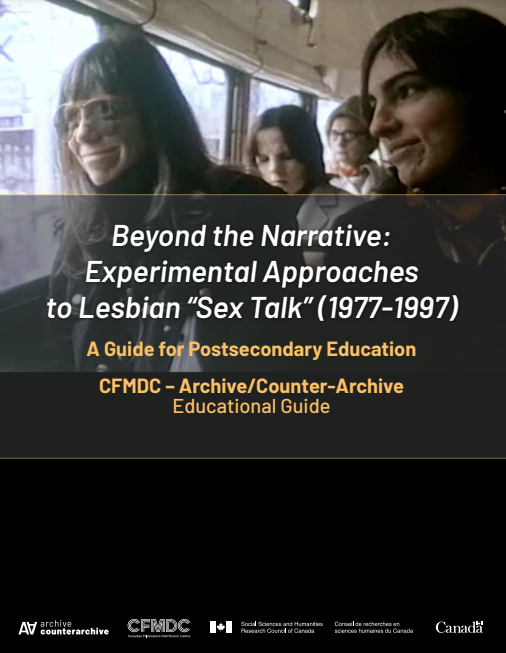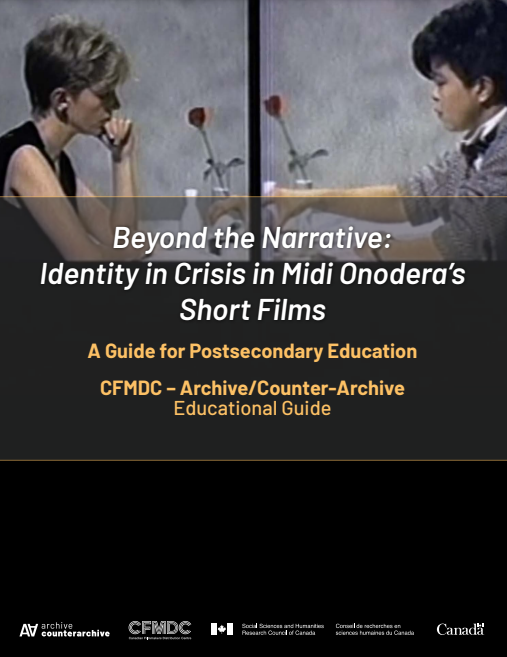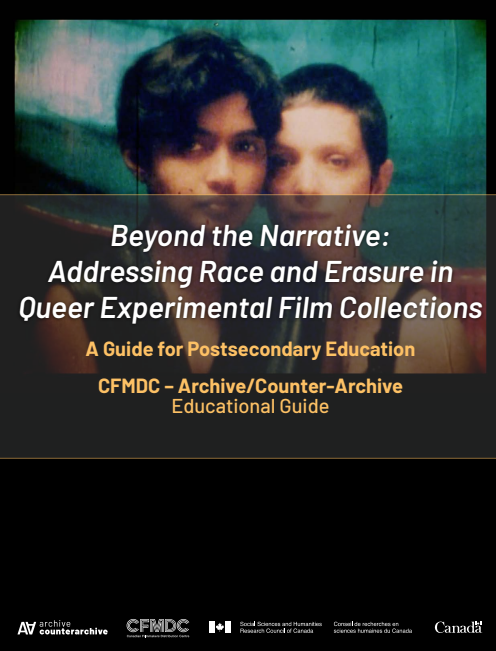Learn more about our collection of Educational Guides for the CFMDC Case Study.
Established in 1967, the Canadian Filmmakers Distribution Centre (CFMDC) is a not-for-profit, non-commercial media arts distributor that specializes in independent, artist-made work on film and video, including works from historically underrepresented communities. CFMDC advocates for a holistic understanding of production, distribution, and exhibition that prioritizes artist rights, accessibility, and the creation of new audiences through education and critical thinking. CFDMC has one of the most important collections of artist-made moving image on film in Canada.
The CFMDC Case Study and these associated Educational Guides focus on key Canadian LGBT2Q films made between the mid-1970s and the early 2000s that have lain dormant in the organization's collection. Many queer works in the collection from this period exist solely on celluloid or in outdated video formats. These formats reflect the influx of affordable technology that became available to queer artists— beginning with more economical film equipment, and then to a greater extent, in the 1980s and 1990s, with video technology. The rapid obsolescence of these formats in the early 2000s, however, has made this era of CFMDC’s LGBT2Q+ collection elusive to scholars, programmers, and the public. Through the Case Study, over 100 titles were digitized from their original format, with the assistance of A/CA's partner organizations and CFMDC’s in-house technical services. The Case Study materials raise important questions, such as: How do these films open up the ways in which the LGBT2Q+ community historicizes themselves in the era of digital technology and retroviral drugs? What do these films reveal about LGBT2Q+ histories that extend beyond the narrative of HIV/AIDS memorialization or queer confessional films? How were women filmmakers in Canada representing LGBT2Q+ identities on-screen during this period? What do these films reveal about LGBT2Q+ resistance?
Each of the guides outlined below is focused on different selected aspects of CFMDC's collection and includes essays from a variety of film and media scholars from across the A/CA network. See each individual section for more information and download links for each respective guide.
Please click on each of the links below to access each of these “Beyond the Narrative” guides and their film programs on VUCACU.com.
-
Identity in Crisis in Midi Onodera’s Short Films. Curated by Axelle Demus and Chloë Brushwood Rose.
-
Experimental Approaches to Lesbian “Sex Talk” (1977-1997). Curated by Cait McKinney and Hazel Meyer.
-
Asynchronicity and Fragmentation in Canadian Queer Experimental Film (1990-2000). Curated by Chris Chong Chan Fui.
-
Addressing Race and Erasure in Queer Experimental Film Collections. Curated by Mahlet Cuff.
Beyond the Narrative: Asynchronicity and Fragmentation in Canadian Queer Experimental Film (1990-2000)

This guide introduces a selection of queer experimental films and videos curated by Chris Chong Chan Fui. It includes a curatorial essay written by Chong, a list of four works suggested for classroom viewing, synopses, and discussion questions oriented toward a range of thematic areas.
Chris Chong Chan Fui is an artist and filmmaker who works with varying materials and moving images in an installation format that interconnects fields such as architecture, science, sports, and economics. Chong has exhibited his works at the Hirschhorn Museum & Sculpture Garden, Palais de Tokyo, EYE Film Institute Netherlands, Austrian Museum of Applied Arts, the Museum of Canadian Contemporary Art, and the Gwangju Biennale. His films have also premiered at the Cannes’ Directors’ Fortnight, Vienna, BFI London, and Toronto’s Wavelengths. Chong is a Smithsonian Institute fellow (National Museum of Natural History), a Ford Foundation fellow, and most recently, he was awarded the prestigious Rockefeller Foundation’s Bellagio Arts Fellowship, Italy. He is currently an Assistant Professor at the School for the Contemporary Arts, Simon Fraser University.
Beyond the Narrative: Experimental Approaches to Lesbian “Sex Talk” (1977-1997)

This guide introduces a selection of films curated by Hazel Meyer and Cait McKinney. It includes a curatorial essay by Meyer and McKinney, a list of five films suggested for classroom viewing, synopses, and discussion questions oriented toward a range of thematic areas.
Hazel Meyer is an artist who works with installation, performance, and text to investigate the relationships between sexuality, infrastructure, and material culture. Cait McKinney is a media historian interested in how queer social movements use digital technologies to share information. Hazel and Cait have been collaborating since 2014 to explore their shared attachments to queer histories and their accessibility through research, writing, video, and archival interventions.
Beyond the Narrative: Identity in Crisis in Midi Onodera’s Short Films

This guide introduces a selection of films by Midi Onodera curated by Educational Guide editors Axelle Demus (York University) and Chloë Brushwood Rose (York University). It includes a curatorial essay by Axelle Demus, a list of six films suggested for classroom viewing, synopses, and discussion questions oriented toward a range of thematic areas.
Midi Onodera is an award-winning filmmaker and media artist who has been making films and videos for 35+ years. She has produced over 25 independent shorts, ranging from 16mm film to digital video to toy camera formats. Her film The Displaced View (1988) was nominated for Best Documentary at the Gemini Awards. Skin Deep (1995), her theatrical feature, screened internationally at festivals including the Rotterdam International Film Festival and the Toronto International Film Festival. Her experimental narrative project ALPHAGIRLS (2002) was the first Canadian interactive performance art DVD. Since 2006, she has made over 500 vidoodles (defined as bite-sized 30-second to 2-minute video doodles). From 2006–07 she published one a day for 365 days and has since released a video project each year, addressing themes of language, media, politics, and everyday life. Onodera’s work is held in collections around the world, and she has given lectures and workshops at galleries and institutions across North America and Japan. She currently teaches and continues to work on experimental media projects in Toronto. In 2018, Midi received the Governor General’s Award for Visual and Media Arts.
>> CLICK HERE TO DOWNLOAD A PDF COPY OF THIS GUIDE (1.63 MB)
Beyond the Narrative: Addressing Race and Erasure in Queer Experimental Film Collections

This guide introduces a selection of films and videos curated by Mahlet Cuff. It includes a curatorial essay by Cuff, a list of five films and videos suggested for classroom viewing, synopses, and discussion questions oriented toward a range of thematic areas.
Mahlet Cuff is an arts cultural worker based in Treaty 1 Territory in so-called Winnipeg, Manitoba. Their curatorial practice focuses on satirical humor as a tool of resistance, the reimagining of Black queer diasporic futures, and archival practices. She has curated work for Window Winnipeg, Take Home BIPOC arts house, Winnipeg Underground Film Festival, Winnipeg Film Group, the8fest, Vancouver Queer Film Festival, Black Flash Expanded and VTape. Cuff is also a part of the curatorial team that is Patterns Collective.
>> CLICK HERE TO DOWNLOAD A PDF COPY OF THIS GUIDE (1.41 MB)

